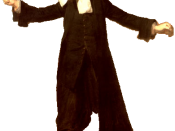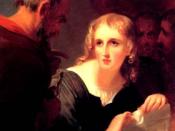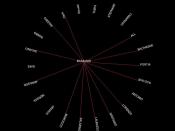A central theme in Shakespeare's The Merchant of Venice involves the delineation of Jewish and Christian ideals. The claim that Christians thrive on spirituality and "bonds of brotherhood" rather than on materialism is expressly conveyed throughout the play by Christian characters. However, there are several instances where this claim proves false. Bassanio can be interpreted as one such character that strays from the established ideals of his religion on several occasions. The language he uses may be interpreted as having materialistic (rather than spiritual) undertones.
A notable instance that implies Bassanio's reversal of religious roles occurs when he opens the lead casket (Act III, scene ii, lines 114-130). Upon discovering he has chosen correctly and has won Portia, he promptly begins to describe the beauty of his bride's likeness painted inside. He proclaims, "Here in her hairs the painter plays the spider, and hath woven a golden mesh t'untrap the hearts of men faster than gnats in cobwebs" (Act III, scene ii, lines 120-123).
This implies that Bassanio regards Portia's beauty as something that, alone, could make men fall in love with her. By Christian standards, a woman's outward appearance is second to the beauty of her spirit, as evidenced by the Christian characters' insistence that the condition of a person's spirit is all that is important (exemplified in one instance by Portia's offer to spare Shylock's life during the trial). Bassanio continues to dwell on the beauty of the portrait as he says, "But her eyes - how could [the artist] see to do them? Having made one, methinks it should have power to steal both his and leave itself unfurnished" (Act III, scene ii, lines 123-126). The fact that Bassanio is dwelling so much on Portia's outward appearance suggests that he puts materialism ahead...


